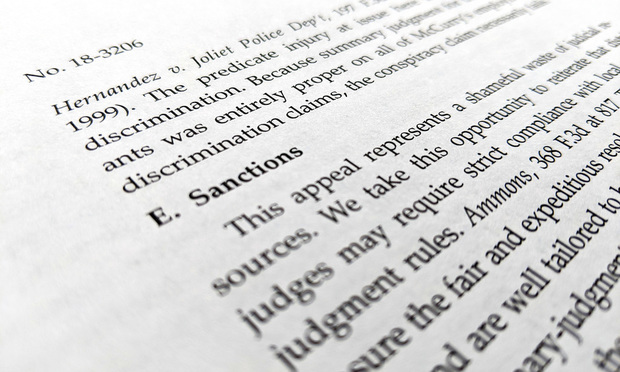'We Draw the Line at Gibberish': US Appeals Court Sanctions Lawyer for 'Incoherent' Brief
The lawyer apologized and accepted responsibility. But sanctions—fees and costs—were still ordered. "The defendants were put to the burden and expense of sorting through and defending against a patently frivolous appeal," a Seventh Circuit panel said.
December 17, 2019 at 02:12 PM
4 minute read
 The Seventh Circuit sanctioned an Illinois lawyer for filing a brief the court called "incoherent."
The Seventh Circuit sanctioned an Illinois lawyer for filing a brief the court called "incoherent."
An Illinois attorney lambasted last month by a federal appeals panel for submitting a "bizarre" and "incoherent" court filing was ordered Monday to pay legal fees as a sanction for wasting the resources of the court and the defense lawyers who defeated alleged discrimination claims.
The lawyer, Jordan T. Hoffman, apologized to the court in late November, asserting that he made a "grave error in judgment" in agreeing to represent a longtime friend in the case in the U.S. Court of Appeals for the Seventh Circuit. That friend, Hoffman said, wrote and filed the brief under Hoffman's name.
"I realize again that these were all grave errors of judgment and I can only apologize to the court and promise that I will never allow this [to] occur again," Hoffman told the Seventh Circuit panel. "I have suffered through the most embarrassing and stressful moments of my legal career and perhaps my life during the oral argument and after the publication of the court's opinion." He continued: "My reputation has been tarnished at the highest level as a result of my actions that caused such a scathing opinion in this matter."
That opinion—written by Judge Diane Sykes, joined by Judges Michael Scudder and Amy St. Eve—indeed skewered Hoffman, a solo practitioner in Aurora, Illinois, for bringing what the court called an "utterly frivolous" appeal. "This appeal represents a shameful waste of judicial resources," Sykes wrote.
The court described Hoffman's brief as a "monstrosity"—laden with unsupported factual assertions. The brief, according to the appeals court, was "chock-full of impenetrable arguments and unsupported assertions, and it is organized in ways that escape our understanding." The court concluded Hoffman violated a federal appellate procedure rule that mandates parties submit briefs that make "a succinct, clear and accurate statement of the arguments."
"Bad writing does not normally warrant sanctions, but we draw the line at gibberish," Sykes said.
Such strong admonitions from courts are rare, but they've flourished, for better or worse, in recent days.
In a New York federal appeal last week, a panel admonished an attorney and ordered him removed from the courtroom for what one judge called "disrespectful" and "discourteous" behavior toward the court. A California federal judge on Monday demanded the resignation of a lawyer who'd written a series of profanity-laced emails to opposing counsel in an insurance-related dispute. "I will not do that," the lawyer responded.
Hoffman, a member of the Illinois bar since 1987, was not reached for comment Tuesday. In his court apology last month, Hoffman said he had "embarrassed the venerable profession of law and the bar to which I have enjoyed the privilege of being a member." He told the court that up until now his "competence has not been called into question nor have I been accused of engaging in non-meritorious claims or litigation."
 Judge Diane Sykes of the U.S. Court of Appeals for the Seventh Circuit. Credit: Diego M. Radzinschi / ALM
Judge Diane Sykes of the U.S. Court of Appeals for the Seventh Circuit. Credit: Diego M. Radzinschi / ALMAt oral argument, the Seventh Circuit panel pressed Hoffman about his brief. He told the court that he is a solo practitioner and that he tries to "get the help of … clients and whoever can provide help."
The appeals court called Hoffman's acceptance of responsibility "appropriate." But the panel was not letting him off the hook.
"Still, judicial resources were needlessly consumed, and the defendants were put to the burden and expense of sorting through and defending against a patently frivolous appeal," Sykes said Monday. "Sanctions are therefore warranted."
Hoffman was ordered to pay fees and "double costs" to the law firms Jackson Lewis and Pennsylvania-based Harmon & Davies for their work in the appeal on behalf of management firm Kenco Logistics Services LLC and the candy maker Mars Inc. Tom Davies, a lawyer for Mars, said Tuesday, "We are pleased with the outcome of the case."
The appeals court set a Jan. 3 deadline for the defense lawyers to file a statement of fees and costs.
Read more:
NY Lawyer Who Was Ejected From 2nd Circuit Courtroom Just Lost His Case
'You Are Acting Inappropriately': 2nd Circuit Scolds Lawyer Before Kicking Him Out
This content has been archived. It is available through our partners, LexisNexis® and Bloomberg Law.
To view this content, please continue to their sites.
Not a Lexis Subscriber?
Subscribe Now
Not a Bloomberg Law Subscriber?
Subscribe Now
NOT FOR REPRINT
© 2025 ALM Global, LLC, All Rights Reserved. Request academic re-use from www.copyright.com. All other uses, submit a request to [email protected]. For more information visit Asset & Logo Licensing.
You Might Like
View All

SEC Official Hints at More Restraint With Industry Bars, Less With Wells Meetings
4 minute read

Sidley Adds Ex-DOJ Criminal Division Deputy Leader, Paul Hastings Adds REIT Partner, in Latest DC Hiring
3 minute readLaw Firms Mentioned
Trending Stories
- 1Law Firms Expand Scope of Immigration Expertise, Amid Blitz of Trump Orders
- 2Latest Boutique Combination in Florida Continues Am Law 200 Merger Activity
- 3Sarno da Costa D’Aniello Maceri LLC Announces Addition of New Office in Eatontown, NJ, and Named Partner
- 4Friday Newspaper
- 5Public Notices/Calendars
Who Got The Work
J. Brugh Lower of Gibbons has entered an appearance for industrial equipment supplier Devco Corporation in a pending trademark infringement lawsuit. The suit, accusing the defendant of selling knock-off Graco products, was filed Dec. 18 in New Jersey District Court by Rivkin Radler on behalf of Graco Inc. and Graco Minnesota. The case, assigned to U.S. District Judge Zahid N. Quraishi, is 3:24-cv-11294, Graco Inc. et al v. Devco Corporation.
Who Got The Work
Rebecca Maller-Stein and Kent A. Yalowitz of Arnold & Porter Kaye Scholer have entered their appearances for Hanaco Venture Capital and its executives, Lior Prosor and David Frankel, in a pending securities lawsuit. The action, filed on Dec. 24 in New York Southern District Court by Zell, Aron & Co. on behalf of Goldeneye Advisors, accuses the defendants of negligently and fraudulently managing the plaintiff's $1 million investment. The case, assigned to U.S. District Judge Vernon S. Broderick, is 1:24-cv-09918, Goldeneye Advisors, LLC v. Hanaco Venture Capital, Ltd. et al.
Who Got The Work
Attorneys from A&O Shearman has stepped in as defense counsel for Toronto-Dominion Bank and other defendants in a pending securities class action. The suit, filed Dec. 11 in New York Southern District Court by Bleichmar Fonti & Auld, accuses the defendants of concealing the bank's 'pervasive' deficiencies in regards to its compliance with the Bank Secrecy Act and the quality of its anti-money laundering controls. The case, assigned to U.S. District Judge Arun Subramanian, is 1:24-cv-09445, Gonzalez v. The Toronto-Dominion Bank et al.
Who Got The Work
Crown Castle International, a Pennsylvania company providing shared communications infrastructure, has turned to Luke D. Wolf of Gordon Rees Scully Mansukhani to fend off a pending breach-of-contract lawsuit. The court action, filed Nov. 25 in Michigan Eastern District Court by Hooper Hathaway PC on behalf of The Town Residences LLC, accuses Crown Castle of failing to transfer approximately $30,000 in utility payments from T-Mobile in breach of a roof-top lease and assignment agreement. The case, assigned to U.S. District Judge Susan K. Declercq, is 2:24-cv-13131, The Town Residences LLC v. T-Mobile US, Inc. et al.
Who Got The Work
Wilfred P. Coronato and Daniel M. Schwartz of McCarter & English have stepped in as defense counsel to Electrolux Home Products Inc. in a pending product liability lawsuit. The court action, filed Nov. 26 in New York Eastern District Court by Poulos Lopiccolo PC and Nagel Rice LLP on behalf of David Stern, alleges that the defendant's refrigerators’ drawers and shelving repeatedly break and fall apart within months after purchase. The case, assigned to U.S. District Judge Joan M. Azrack, is 2:24-cv-08204, Stern v. Electrolux Home Products, Inc.
Featured Firms
Law Offices of Gary Martin Hays & Associates, P.C.
(470) 294-1674
Law Offices of Mark E. Salomone
(857) 444-6468
Smith & Hassler
(713) 739-1250








